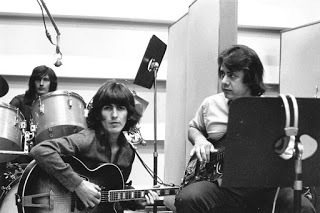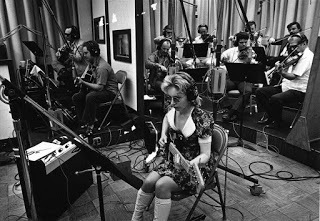The Wrecking Crew is not a band…
 Based on a popular documentary from 2008, many are under the impression that The Wrecking Crew was, indeed, a band. Instead, The Wrecking Crew was a nickname for 15 to 35 California-based studio musicians who worked with artists from the early 1960s until 1974, particularly Sonny and Cher ("The Beat Goes On"), The Mamas and the Papas ("California Dreamin'") and The Beach Boys. "Wouldn't It Be Nice" is a shining moment in rock history; the instrumentation for the Pet Sounds opening track one of popular music's finest achievements.
Based on a popular documentary from 2008, many are under the impression that The Wrecking Crew was, indeed, a band. Instead, The Wrecking Crew was a nickname for 15 to 35 California-based studio musicians who worked with artists from the early 1960s until 1974, particularly Sonny and Cher ("The Beat Goes On"), The Mamas and the Papas ("California Dreamin'") and The Beach Boys. "Wouldn't It Be Nice" is a shining moment in rock history; the instrumentation for the Pet Sounds opening track one of popular music's finest achievements.Incredible musicians like Max Bennett who worked alongside Frank Zappa as the bassist for the Hot Rats project, Carol Kaye, whose bassline for "The Beat Goes On" remains the most famous bass riff of all time, Glen Campbell (Guitar) and Leon Russell (Keyboards) convened in an everchanging array of the world’s most talented musicians. It was The Wrecking Crew's talent and expertise that led to the rise of the classic rock 'n' roll era of the 70s, and ironically also brought about their own demise.
 The collective Wrecking Crew went uncredited for most of their history. When critics, for example, contemplate the top bassists or drummers of the rock era, the names often and deservedly listed are Chris Squire (bass, Yes), John Entwistle (bass, The Who), Jack Bruce (bass, Cream), Bill Bruford (Drums, Yes; King Crimson), John Bonham (Drums, Led Zeppelin), but the likes of Carol Kaye and Hal Blaine remain anonymous. It’s a scenario in the industry leftover from the era of the American Standard and singers like Frank Sinatra, Sammy Davis Junior and Doris Day. During the 1940s, the Big Band Era, band leaders like Glen Miller, Harry James and Tommy Dorsey had singers as members of the band. As the era faded, those singers would then tour and record with talented though unknown musicians. By the late 1950s, many of these musicians settled in L.A., working the studio circuit. The Wrecking Crew (minus the name) was born.
The collective Wrecking Crew went uncredited for most of their history. When critics, for example, contemplate the top bassists or drummers of the rock era, the names often and deservedly listed are Chris Squire (bass, Yes), John Entwistle (bass, The Who), Jack Bruce (bass, Cream), Bill Bruford (Drums, Yes; King Crimson), John Bonham (Drums, Led Zeppelin), but the likes of Carol Kaye and Hal Blaine remain anonymous. It’s a scenario in the industry leftover from the era of the American Standard and singers like Frank Sinatra, Sammy Davis Junior and Doris Day. During the 1940s, the Big Band Era, band leaders like Glen Miller, Harry James and Tommy Dorsey had singers as members of the band. As the era faded, those singers would then tour and record with talented though unknown musicians. By the late 1950s, many of these musicians settled in L.A., working the studio circuit. The Wrecking Crew (minus the name) was born.With artists like Sonny and Cher, Petula Clark and The 5th Dimension there was no presumption of these singers playing their own instruments. Studios would hire musicians on a per diem basis and a track like “The Beat Goes On” would be recorded in a matter of hours. That time frame was important in the industry; studio time was expensive and record labels demanded quality in no time at all. The Beach Boys were indeed capable of playing their own instruments, but they were young and inexperienced, and even back in 1961 when he was 19 years old, Brian Wilson was a perfectionist. To save on studio time, in came The Crew. That incredible guitar on "Surfin' USA" was all the work of Carl Wilson (you thought I was going to say The Wrecking Crew), but in the name of expediency, The Crew was called in to "double track" the production to get it done. Here, as was often the case, The Crew went uncredited and anonymous without so much as a receipt or a paper trail of their contribution.
 Brian Wilson's expertise as a producer brought Carol Kaye into his purview in 1965 and subsequently led to his using The Crew exclusively on the Pet Sounds sessions, not even including any of the other Beach Boys in the initial production of the LP. The instrumental track for “Wouldn’t It Be Nice” was laid down with the other band members out on tour, unaware that Brian was busily at work on his masterpiece. As the story goes, when the other Beach Boys returned from touring, it was with the intent of returning to the studio and returning to the patented Beach Boys surfin’ sound which Brian had outgrown. When the band, led by singer/songwriter Mike Love, threatened to revolt (to either quit the band or fire Brian), founding member and multi-instrumentalist Al Jardine played the instrumental track for "Wouldn’t It Be Nice" and asked "Are you sure you don’t want to be a part of that?"
Brian Wilson's expertise as a producer brought Carol Kaye into his purview in 1965 and subsequently led to his using The Crew exclusively on the Pet Sounds sessions, not even including any of the other Beach Boys in the initial production of the LP. The instrumental track for “Wouldn’t It Be Nice” was laid down with the other band members out on tour, unaware that Brian was busily at work on his masterpiece. As the story goes, when the other Beach Boys returned from touring, it was with the intent of returning to the studio and returning to the patented Beach Boys surfin’ sound which Brian had outgrown. When the band, led by singer/songwriter Mike Love, threatened to revolt (to either quit the band or fire Brian), founding member and multi-instrumentalist Al Jardine played the instrumental track for "Wouldn’t It Be Nice" and asked "Are you sure you don’t want to be a part of that?"This vignette proves a point: the proficiency of musicians like Jardine, who played a myriad of stringed instruments including the stand-up bass on early Beach Boys tracks, was trumped by the talent and expertise of The Wrecking Crew. Roger McGuinn of The Byrds said The Crew and he "knocked out two tracks in one three-hour session. When the rest of the band got to play, it took us 77 takes to get 'Turn! Turn! Turn!'"
The Wrecking Crew can be heard on hits like Johnny Rivers' "The Poor Side of Town," "You're my Soul and Inspiration" from The Righteous Brothers, Nancy Sinatra's "These Boots Are Made For Walkin'," Simon and Garfunkel's "Mrs. Robinson," and hundreds of others. I'll go out on a limb and say that The Wrecking Crew, despite their anonymity and lack of any record-keeping, has record sales in the hundreds of millions. The Beatles have 27 No. 1 selling singles, and while that record is unapproachable, if The Wrecking Crew Really was a band, they would have more than 100 No. 1s! As an example, Drummer Hal Blaine played on 40 U.S. No. 1s and over 150 songs that entered the Top 10.
It's interesting to note that The Crew's incredible musicianship ushered in its own demise. In 1967, The Crew recorded, under Jimmy Webb's direction, the Richard Harris smash hit "MacArthur Park." That single, originally written for The Association, broke the mold in the record industry establishing the model for songs over three minutes and clocking in at 7:21. The dominoes continued to fall with singles like "Hey Jude" at over six minutes and 1971's "Stairway to Heaven" at 8:02. Lengthier songs on the radio meant the number of tracks played per hour was diminished providing less work for studio musicians. "MacArthur Park" had opened the doors for bands like Genesis and Pink Floyd to create songs that exceeded ten minutes and often covered an album side. That freedom, the experimentation, and the artistry of bands rising in the early 70s would end The Crew's dominance and 1974's "Love Will Keep Us Together," by The Captain and Tennille, the biggest selling single of the year, would be their last No. 1.
And yet…
Stay tuned to AM for "The California Sound."
Published on October 20, 2019 06:54
No comments have been added yet.



